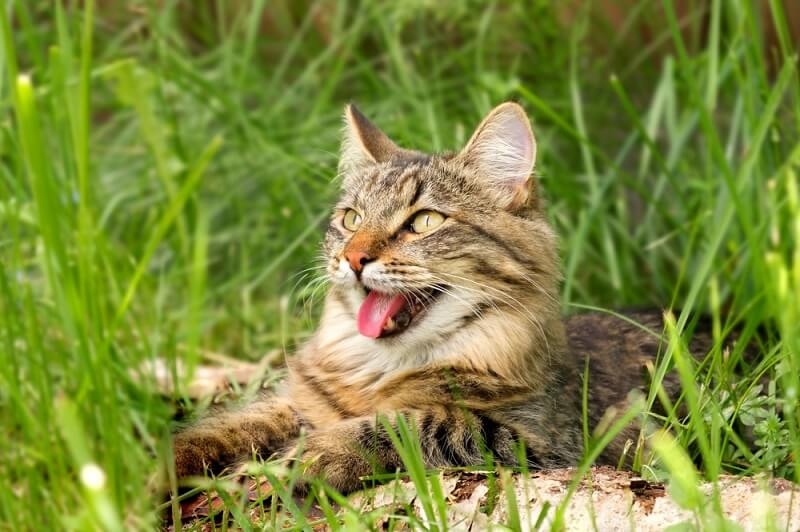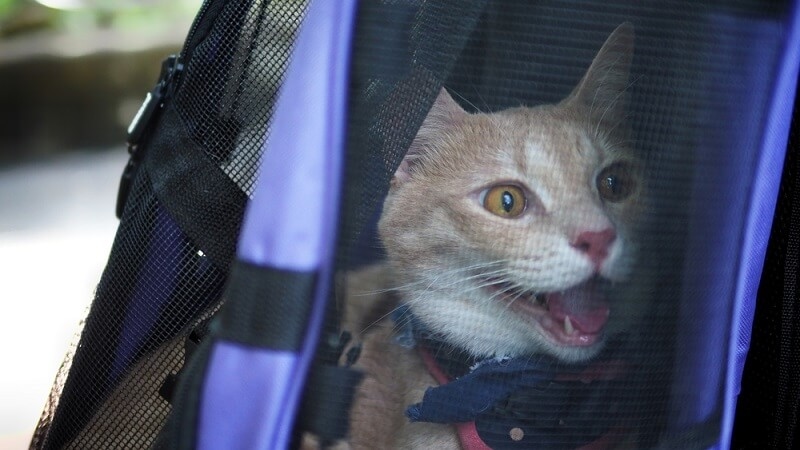
It’s a warm afternoon. Your cat jumps up on the couch after chasing a toy across the room. Then you notice something strange—her mouth is open, chest moving quickly, almost like a dog. And the first thought that rushes in? Why is my cat panting?
If you’ve ever caught your feline doing this, you know the worry it stirs. Cats aren’t built like dogs; panting is not their go-to cooling method. So when it happens, it raises questions and sometimes panic.
So, why is my cat panting in the first place? The short answer is that it depends. In some cases, panting can be perfectly harmless. Maybe she’s overheated after an intense play session or nervous during a vet visit. But other times, panting is a sign of something serious.
Cats don’t pant casually. When they breathe heavily, it’s often because their bodies are stressed—by temperature, exertion, or an underlying health issue. Recognizing which scenario you’re dealing with makes all the difference.
It’s worth noting that not every episode is an emergency. Just like dogs, cats may pant when they’re hot or tired. But the difference is in frequency and duration. A few minutes after a chase or being outside in summer heat? Possibly okay. But if your cat continues breathing heavily after cooling down, it’s time to pay attention.
Understanding cat panting causes helps owners draw that line between normal and abnormal. Environmental heat, stress, and physical exertion are common triggers. Illness, heart disease, or respiratory problems fall on the serious side.
Let’s look at the most common cat panting causes:
The tricky part is knowing when to shrug it off and when to call the vet.
When panting tips over into heavy breathing in cats, it’s rarely good news. Unlike the occasional puff after play, heavy, prolonged breathing often points to a medical issue. You might notice rapid chest movements, wheezing, or a raspy sound.
Some cats will stretch their necks forward or sit with elbows out to expand their chest cavity. That posture is a red flag. It’s the body trying to compensate for lack of oxygen. If you see this, don’t wait—get your cat checked.

Few sights are more alarming than cat breathing fast with open mouth. A panting cat with lips curled back, tongue out—it looks unnatural because it is. While dogs use open-mouth breathing as normal cooling, cats do not.
This type of breathing may follow intense activity, but it should resolve quickly. If it lingers, it could mean asthma, bronchitis, heart disease, or even a blockage in the airway. Cats can deteriorate quickly, so prolonged open-mouth breathing deserves urgent attention.
The medical term for labored breathing is dyspnea in cats (difficulty breathing). It covers everything from noisy wheezing to visible effort in each breath. Unlike light panting from play, dyspnea signals that oxygen isn’t moving through the lungs efficiently.
Possible reasons include fluid in the chest, trauma, or respiratory disease. Cats experiencing dyspnea may crouch low, keep their mouths open, and seem restless. They might even refuse to lie down, because it worsens their breathing. This is one of those cases where waiting is not safe—immediate veterinary care is crucial.
Further Reading: Spot Early Signs and Get Relief Fast from Dog Ear Infections
There’s one situation where panting looks less scary: cat panting after exercise. Kittens and young cats, especially high-energy breeds, sometimes run themselves ragged. After a sprint up and down the stairs, they may flop down, tongues out, panting like tiny lions.
If it stops within a minute or two, it’s generally nothing to worry about. But if your cat continues panting long after the game is over, something else may be at play. Always watch the duration, frequency, and intensity. A quick pant after zoomies is fine. Ongoing panting isn’t.
So, when do you shift from observing to dialing the vet’s number? Here are the red flags:
These aren’t things to wait out. Cats mask illness well, and by the time you see these signs, they may already be in distress.
If you bring in a panting cat, the vet will likely start with a physical exam, listening to the chest for wheezes, crackles, or irregular heartbeats. X-rays or blood tests may follow. Depending on what they find, treatment might involve oxygen therapy, medication for asthma, antibiotics for infection, or even hospitalization in severe cases.
For cats that pant occasionally from heat or mild stress, there are things you can do at home:
These small steps won’t fix underlying illness, but they help keep healthy cats comfortable.
In Case You Missed It: Valuable Cat Grooming for Long Hair Tips to Reduce Shedding
Panting in cats is one of those behaviors that grabs your attention for good reason. Unlike dogs, cats don’t pant as part of daily life. When you catch yourself asking why is my cat panting, the answer ranges from harmless play to serious illness. The key is paying attention to context, duration, and any other symptoms.
If you’re ever in doubt, call your vet. Better to feel overly cautious than risk ignoring a serious condition. Because when it comes to your cat’s breathing, time matters. And those few extra minutes could make all the difference.
This content was created by AI